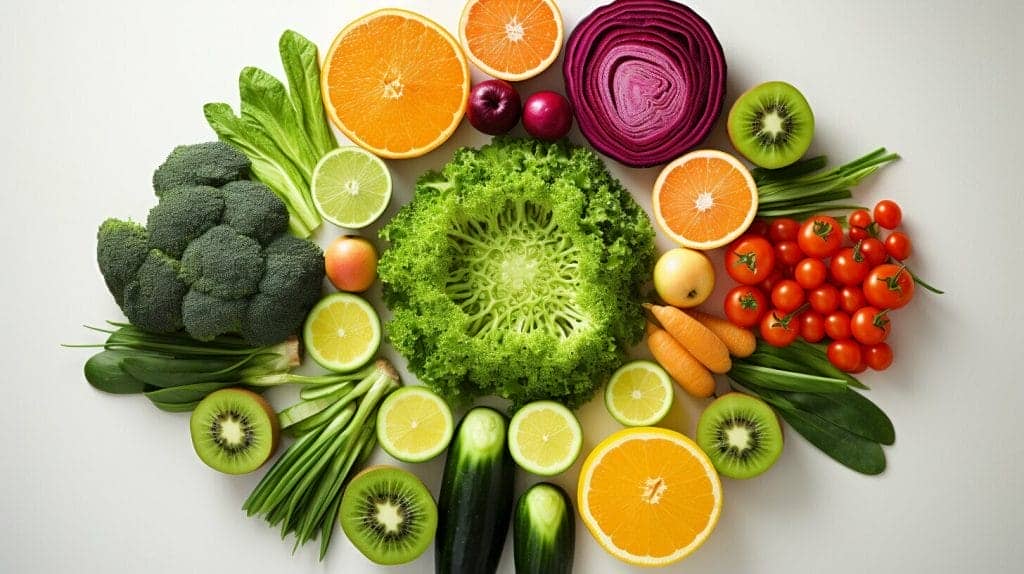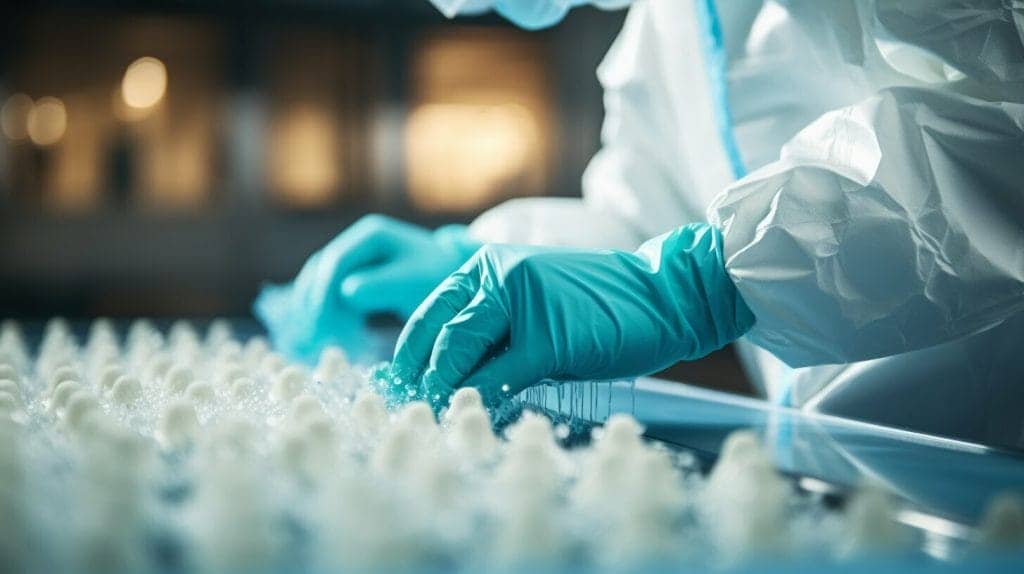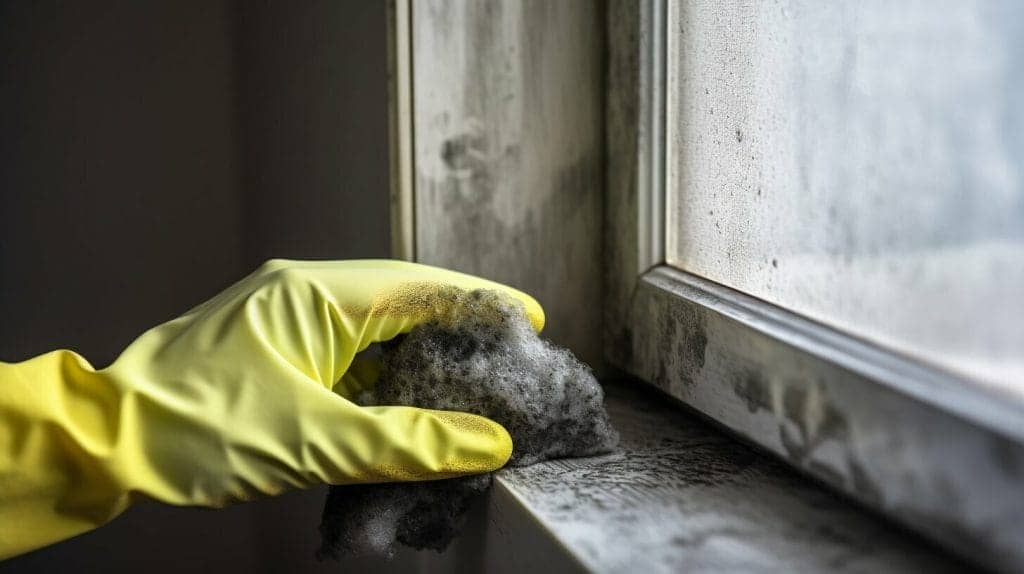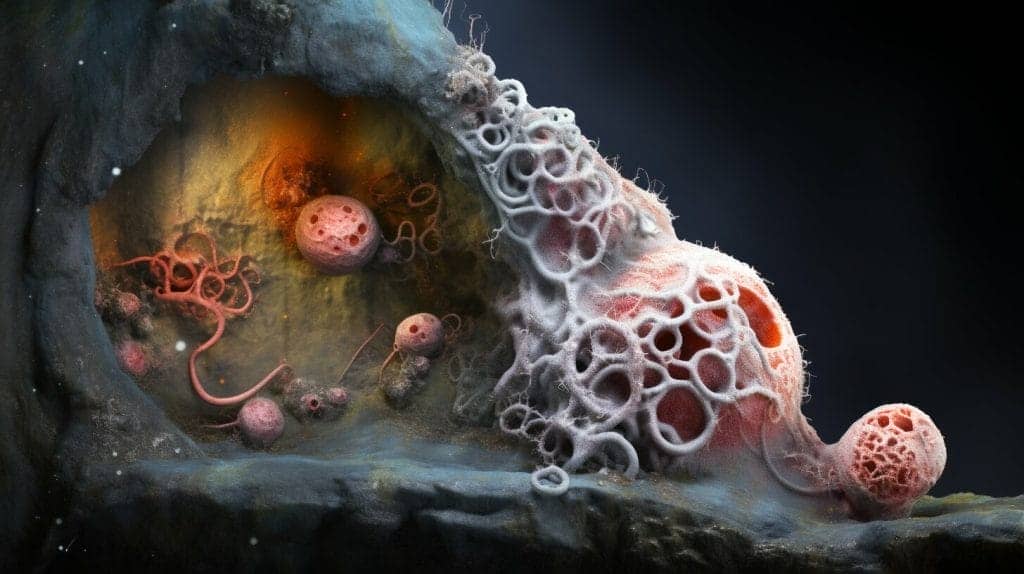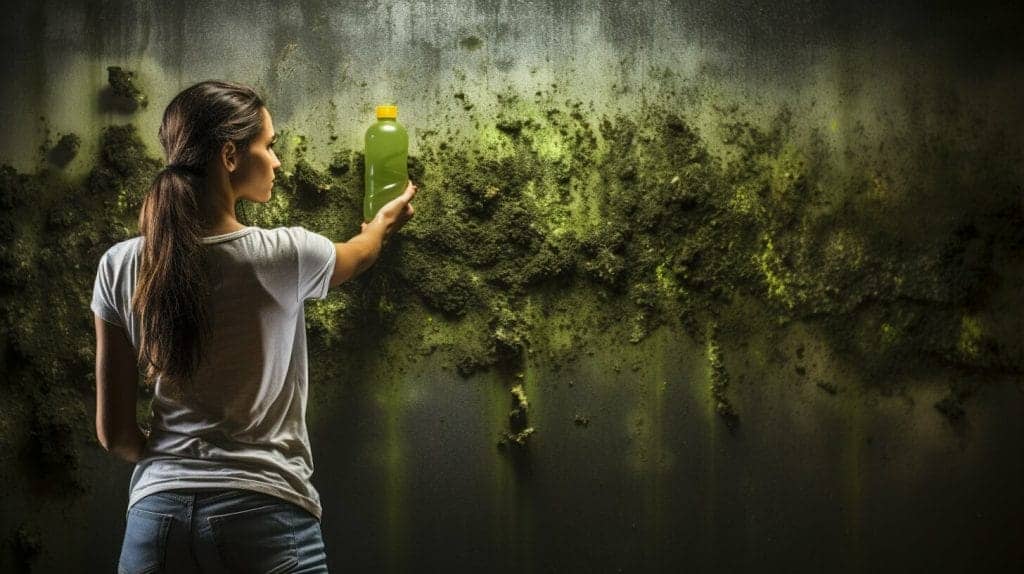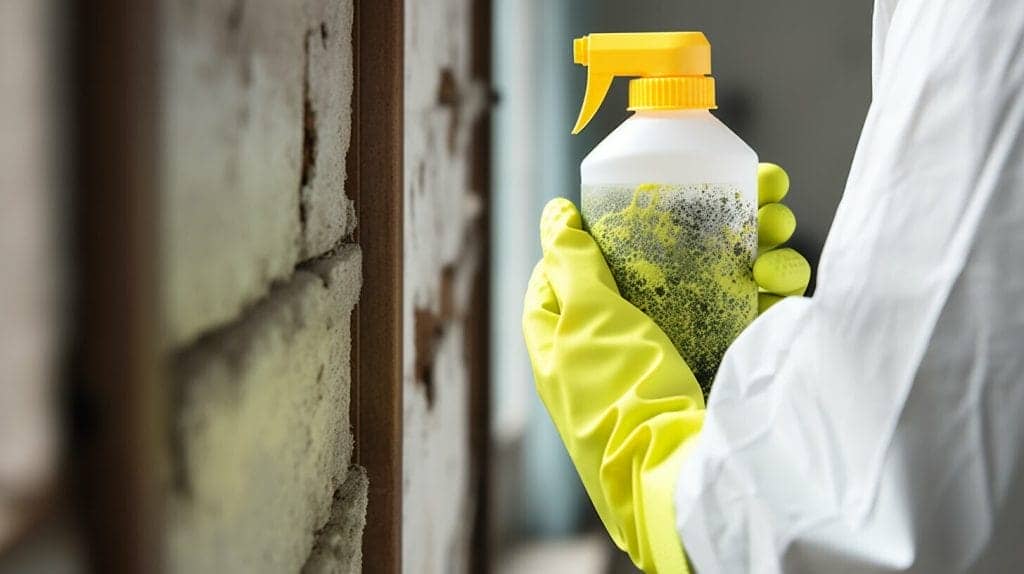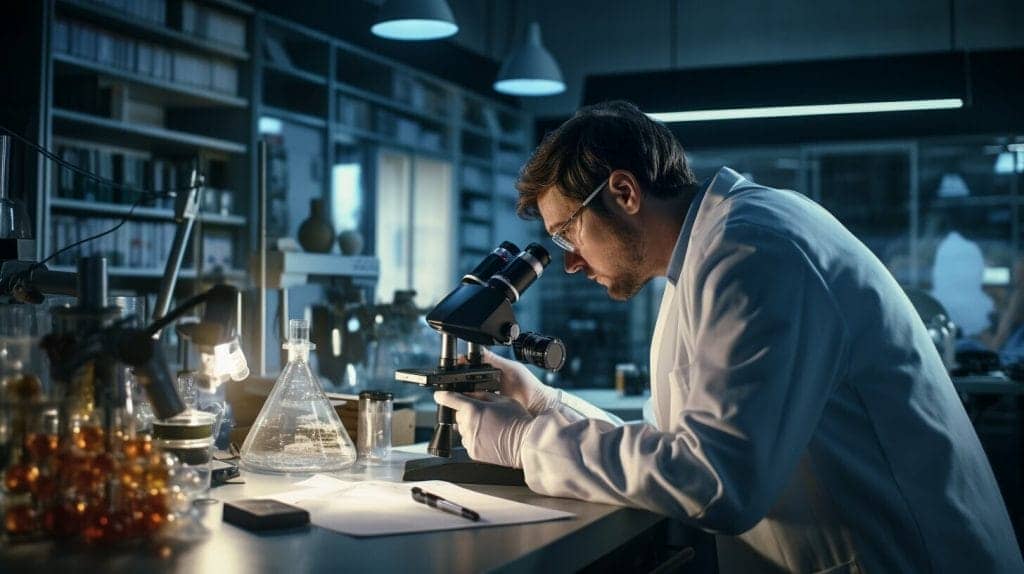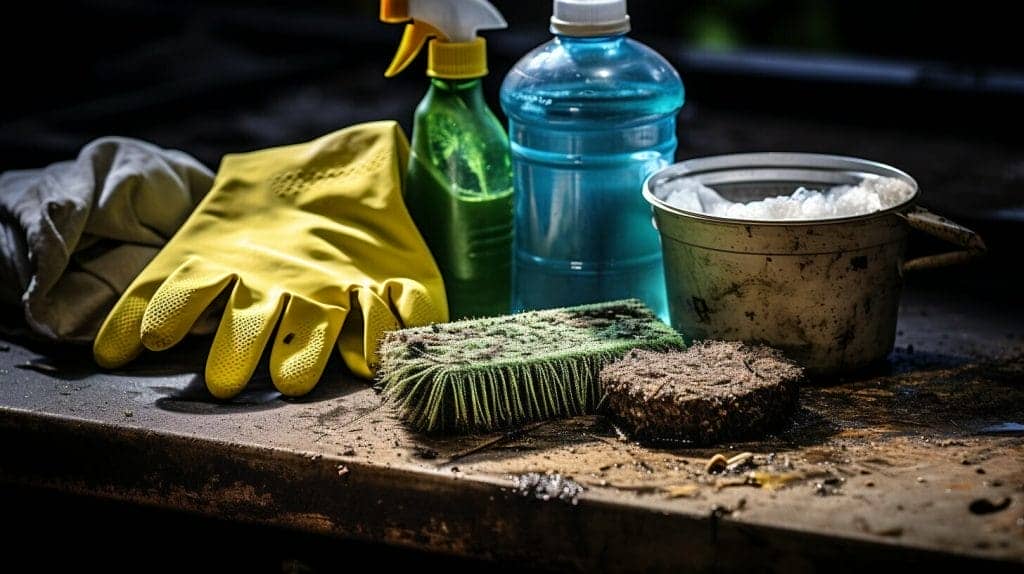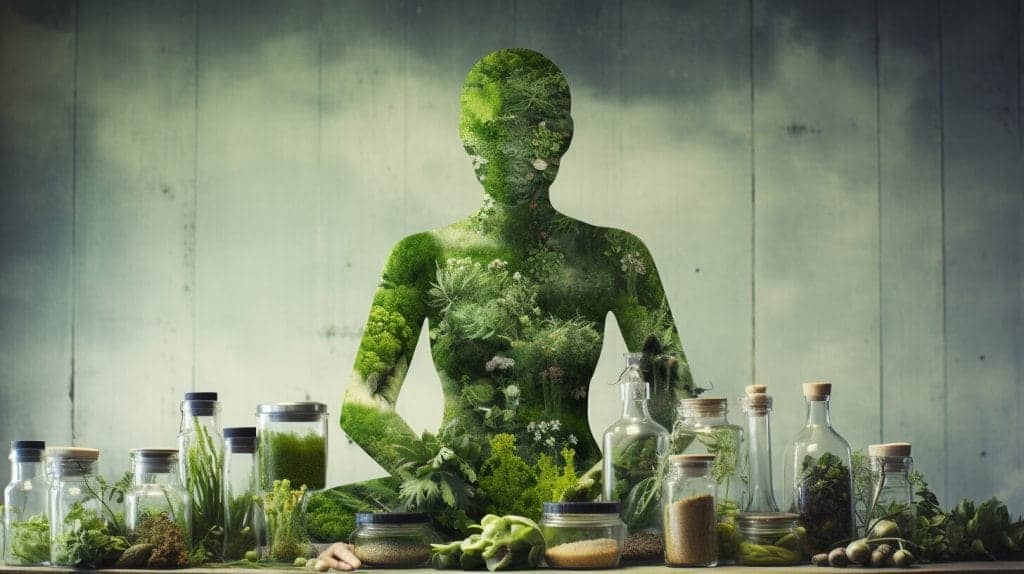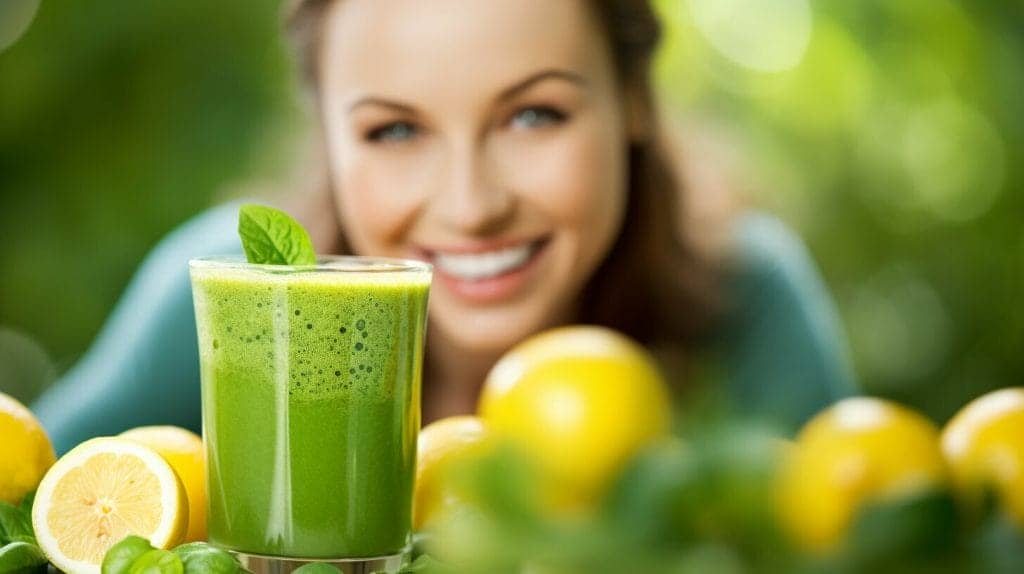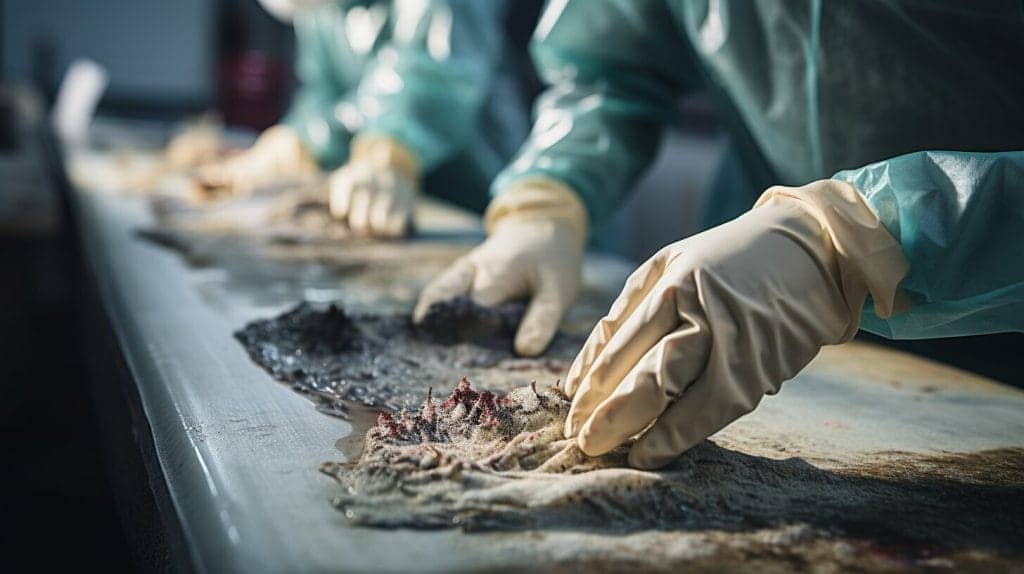Mold is a common problem in many homes, and exposure to mold toxins can have serious effects on one’s health, including respiratory issues, skin irritation, fatigue, and even neurological symptoms. While it is important to address and remove mold from one’s environment, it is equally important to support the body’s natural detoxification processes in eliminating mold toxins from the body.
One effective way to support mold detoxification is through dietary changes. Incorporating specific foods into one’s diet can aid in eliminating mold toxins and promoting overall health and well-being. In this comprehensive guide, we will explore the top foods and nutrients that can aid in mold detoxification and discuss other lifestyle changes and holistic treatments that can support the detoxification process.
Key Takeaways:
- Mold toxins can have serious effects on one’s health and should be addressed through a comprehensive approach.
- Incorporating specific foods into one’s diet can aid in eliminating mold toxins and promoting overall health and well-being.
- A holistic approach to mold detoxification includes lifestyle changes and holistic treatments in addition to dietary changes.
Understanding Mold Toxicity and Its Effects on Health
Mold is a type of fungus that can grow in damp or humid environments, and it can pose a serious health risk if left unattended. Mold toxicity occurs when an individual inhales or ingests mold spores, leading to a range of symptoms and potential health complications. Mold toxicity can impact the respiratory system, immune system, and even the nervous system.
Common symptoms of mold toxicity can include coughing, wheezing, shortness of breath, fatigue, headaches, and skin irritation. If left untreated, mold toxicity can lead to more severe health issues, including chronic inflammation, neurological damage, and even cancer.
When it comes to addressing mold toxicity, a comprehensive approach is necessary. This includes addressing any sources of mold exposure and incorporating dietary changes to support the body’s natural detoxification processes. By consuming mold-detoxifying foods and supplements, individuals can aid their body’s ability to eliminate mold toxins and reduce the risk of health complications.
The Role of Diet in Mold Detoxification
When it comes to eliminating mold toxins from the body, diet plays a crucial role. Certain foods contain nutrients and compounds that aid in the detoxification process and support overall health.
One of the key components in mold detoxification is fiber. Fiber-rich foods help eliminate mold toxins from the body by binding to them and preventing their reabsorption. Foods high in fiber include fruits and vegetables, whole grains, and legumes.
Another important nutrient for mold detoxification is sulfur. Sulfur-rich foods, such as garlic, onions, and cruciferous vegetables like broccoli and cauliflower, help support liver function and aid in eliminating mold toxins.
Probiotic-rich foods, like yogurt and kefir, can also aid in mold detoxification by supporting gut health. A healthy gut microbiome is essential in eliminating toxins from the body and preventing their reabsorption.
Other foods with mold detoxification properties include antioxidants like berries, leafy greens, and nuts, which combat oxidative stress caused by mold toxins, and anti-inflammatory foods like turmeric, which help reduce inflammation in the body.
It’s important to note that incorporating these foods alone may not be enough to fully support mold detoxification, but they can certainly aid in the process when combined with other lifestyle changes and treatments.
Top Foods for Mold Detoxification
When it comes to supporting the body’s detoxification of mold toxins, specific foods can be particularly helpful. Here are some of the top mold-detoxifying foods to incorporate into your diet:
| Food | Nutrient/Compound | Description |
|---|---|---|
| Cilantro | Chelating agents | Helps to remove heavy metals and other toxins from the body and has been shown to bind to mercury, lead, and aluminum. |
| Garlic | Antifungal, anti-inflammatory | Contains sulfur compounds that are known to have powerful antifungal and anti-inflammatory properties. |
| Turmeric | Antioxidant, anti-inflammatory | Contains curcumin, a compound with potent antioxidant and anti-inflammatory properties that can help combat oxidative stress caused by mold toxins. |
| Green tea | Antioxidant | Contains high levels of antioxidants, specifically catechins, which can help support the body’s overall detoxification processes. |
| Broccoli sprouts | Sulforaphane | A compound found in high concentrations in broccoli sprouts that is known to enhance the body’s detoxification pathways. |
| Beets | Betaine, antioxidants | Contains betaine, a compound that can help support liver function and detoxification, as well as antioxidants to combat the effects of oxidative stress. |
| Lemons | Vitamin C | A great source of vitamin C, which can help support the immune system and overall detoxification processes. |
These foods can be incorporated into a variety of meals and recipes to support mold detoxification. Try adding cilantro to a salad or smoothie, using garlic and turmeric in cooking, and enjoying a cup of green tea with a meal. By incorporating these foods into your diet, you can support your body’s natural ability to eliminate mold toxins.
The Power of Antioxidants in Mold Detoxification
Antioxidants play a crucial role in mold detoxification by helping to combat the oxidative stress caused by mold toxins. Oxidative stress can lead to damage in cells and DNA, making it important to incorporate antioxidant-rich foods into your mold detoxification diet.
Some of the best antioxidant sources include berries, leafy greens, and nuts. Berries are particularly rich in polyphenols, which have been shown to have strong antioxidant and anti-inflammatory effects. Leafy greens, such as kale and spinach, are high in vitamins C and E, both powerful antioxidants. Nuts, especially almonds and walnuts, are rich in vitamin E and other antioxidants like polyphenols and flavonoids.
Incorporating these antioxidant-rich foods into your diet can help support your body’s mold detoxification process and promote overall health and well-being. It is important to note that while supplements can be a convenient way to increase antioxidant intake, a balanced diet with whole foods is the best approach for optimal health benefits.
The Role of Diet in Mold Detoxification
When dealing with mold toxicity, incorporating specific foods into the diet can play a vital role in supporting the body’s natural detoxification process. Certain nutrients and compounds found in these foods can aid in eliminating mold toxins from the body, making them an essential part of any comprehensive approach to mold detoxification.
The right foods can help support the liver, which is responsible for filtering toxins from the body. They can also aid in digestion, leading to better absorption of nutrients and elimination of waste products. Additionally, these foods can boost the immune system and reduce inflammation, which are essential factors in combating mold toxicity.
Overall, a diet rich in whole, unprocessed foods, and low in sugar and processed foods can support mold detoxification. By incorporating nutrient-dense foods into your diet, you can help your body eliminate mold toxins and improve your overall health.
The Importance of Hydration in Mold Detoxification
Proper hydration is a crucial component of any mold detoxification program. Water is essential for flushing toxins out of the body, and staying hydrated can support the work of the liver and kidneys in eliminating mold toxins. When detoxing from mold, it’s important to prioritize filtered water and herbal teas, which can provide additional benefits.
Filtered water can help prevent exposure to additional mold toxins and other contaminants that may be present in tap water. Herbal teas, such as ginger tea or dandelion tea, can support the liver’s detoxification processes and aid in reducing inflammation caused by mold toxicity.
Individuals detoxing from mold should aim to drink at least 8-10 cups of water per day, and more if they are sweating or experiencing diarrhea. In addition to filtered water and herbal teas, other hydrating foods can be incorporated into the diet, such as fruits and vegetables with high water content.
The Role of Diet in Mold Detoxification
Eating a balanced diet full of nutrient-dense foods is an essential component of mold detoxification. Specific foods can help support the body’s natural detoxification processes and promote the elimination of mold toxins. By incorporating these foods into your diet, you can aid in the mold detoxification process and promote overall health and well-being.
When it comes to mold detoxification, the body requires certain nutrients to support the elimination of toxins. These nutrients can be found in various foods, including vegetables, fruits, and proteins. Specific compounds found in these foods, such as antioxidants and anti-inflammatory agents, can also help combat the oxidative stress caused by mold toxins.
Experts recommend incorporating a variety of fruits and vegetables into your diet to support mold detoxification. Some of the most effective mold detoxifying foods include leafy greens, cilantro, garlic, turmeric, and green tea. These foods contain powerful compounds that can aid in the elimination of mold toxins and promote overall health.
| Food | Benefits |
|---|---|
| Leafy Greens | Rich in antioxidants and other essential nutrients that support the body’s natural detoxification process |
| Cilantro | Contains compounds that help bind to and eliminate heavy metals and other toxins from the body |
| Garlic | Contains sulfur compounds that help support liver function and aid in the elimination of toxins |
| Turmeric | Contains anti-inflammatory agents that can help reduce inflammation caused by mold toxins |
| Green Tea | Contains antioxidants that can help combat oxidative stress caused by mold toxins |
In addition to these specific foods, probiotics and fermented foods can help support gut health and aid in the mold detoxification process. Drinking enough water and avoiding dehydration is also crucial during mold detoxification, as proper hydration can help flush out toxins and support the body’s natural detoxification processes.
By incorporating mold-detoxifying foods into your diet, you can aid in the elimination of mold toxins and promote overall health and well-being. Consult with a healthcare professional to determine if a mold detoxification diet is right for you.
The Role of Nutritional Supplements in Mold Detoxification
While incorporating mold-detoxifying foods into your diet is important, nutritional supplements can also aid in the detoxification process. It is important to consult with a healthcare professional before starting any new supplementation to ensure safety and effectiveness.
| Nutritional Supplement | How it Aids in Mold Detoxification |
|---|---|
| Activated charcoal | Helps bind to mold toxins and remove them from the body |
| Chlorella | Contains chlorophyll which aids in toxin elimination and supports liver function |
| Milk Thistle | Supports liver function and aids in toxin elimination |
Other supplements that may be beneficial in mold detoxification include vitamin C, magnesium, and probiotics. It is important to remember that supplementation should not be relied upon as the sole method of mold detoxification and should be used in conjunction with a healthy diet and lifestyle changes.
Incorporating nutritional supplements into a comprehensive mold detoxification plan can aid in the elimination of mold toxins and support overall health and well-being.
Lifestyle Changes to Support Mold Detoxification
In addition to incorporating mold-detoxifying foods into one’s diet, there are several lifestyle changes that can support the body’s natural detoxification process and aid in the elimination of mold toxins.
Reduce Exposure to Mold
One of the first steps in preventing mold toxicity is to reduce exposure to mold. This includes avoiding damp locations and areas with visible mold, using exhaust fans in bathrooms and kitchens, and fixing leaks promptly.
Manage Stress
Stress can weaken the immune system, making it harder for the body to eliminate toxins. Managing stress through relaxation techniques like meditation, yoga or tai chi can support the body’s detoxification processes.
Get Regular Exercise
Regular exercise aids in the elimination of toxins through sweat and increased circulation. Exercise can also improve lung and respiratory function, making it easier for the body to eliminate mold toxins.
Prioritize Sleep
A good night’s sleep is crucial in allowing the body to repair and regenerate. This includes the elimination of toxins, making it important to prioritize sleep as a vital component of a holistic approach to mold detoxification.
Personal Hygiene
Practicing good personal hygiene, such as washing hands frequently, can prevent the spread of mold spores and reduce the risk of exposure.
Conclusion
Incorporating mold-detoxifying foods into one’s diet and adopting lifestyle changes that support the body’s natural detoxification process can aid in the elimination of mold toxins. By being vigilant in mold prevention and seeking professional help when necessary, individuals can take proactive steps towards overall health and well-being.
Tips for Preventing Mold Exposure
Preventing mold exposure is crucial for maintaining good health and reducing the risk of mold toxicity. Here are some tips for preventing mold growth in your home:
- Keep humidity levels below 60% by using dehumidifiers and air conditioners.
- Fix leaks and water damage promptly.
- Clean and dry any damp or wet areas within 24-48 hours.
- Improve ventilation in bathrooms, kitchens, and other areas prone to moisture.
- Use exhaust fans or open windows when cooking, showering, or doing laundry.
- Regularly clean and maintain air conditioning units, ducts, and filters.
- Avoid carpeting in areas with high moisture, such as basements or bathrooms.
- Store clothes and linens in dry areas with good air circulation.
By following these tips, you can significantly reduce the risk of mold growth in your home and prevent exposure to mold toxins.
Seeking Professional Help for Mold Detoxification
While incorporating the right foods into your diet is an essential part of mold detoxification, it’s important to seek professional help if you’re dealing with severe mold toxicity. Consulting with a healthcare provider or functional medicine practitioner can provide a personalized approach to mold detoxification and ensure that you receive the support and guidance you need.
Professional help may also be necessary if you’re experiencing persistent symptoms despite dietary changes and other lifestyle adjustments. A healthcare professional can assess your individual situation, recommend additional treatments or tests, and monitor your progress over time.
Conclusion
Overall, incorporating mold-detoxifying foods into your diet is crucial for eliminating mold toxins from your body and promoting overall health and well-being. By understanding mold toxicity and its effects on health, as well as the role of diet, antioxidants, gut health, hydration, nutritional supplements, and lifestyle changes in supporting mold detoxification, you can take a holistic approach to this process.
For those dealing with severe mold toxicity, seeking professional help, such as a healthcare provider or functional medicine practitioner, is highly recommended. Oasis Medical Institute in Tijuana, Mexico, offers a holistic Mold Toxicity treatment program that can support individuals in their mold detoxification journey.
Book a Consultation Today
To learn more about the holistic treatments available at Oasis Medical Institute, including guidance from Dr. Francisco Contreras MD, book a consultation today by calling [insert phone number] or emailing [insert email address].
FAQ
Q: What are the benefits of mold detoxification?
A: Mold detoxification can have several benefits for overall health and well-being. It helps eliminate mold toxins from the body, reduces symptoms of mold toxicity, improves respiratory health, boosts the immune system, and promotes a healthier gut microbiome.
Q: What is mold toxicity and how does it affect health?
A: Mold toxicity refers to the harmful effects of mold exposure on the body. It can lead to various health issues, including respiratory problems, allergies, fatigue, brain fog, skin rashes, and compromised immune function. Addressing mold toxicity through a comprehensive approach, including dietary changes, is crucial for restoring health.
Q: What role does diet play in mold detoxification?
A: Diet plays a significant role in mold detoxification. By incorporating specific foods into your diet, you can support the body’s natural detoxification processes and aid in the elimination of mold toxins. These detoxifying foods are rich in nutrients and compounds that promote healing and elimination of toxins.
Q: What are the top foods for mold detoxification?
A: Some of the top foods for mold detoxification include cilantro, garlic, turmeric, green tea, and other antioxidant-rich foods. These foods have natural detoxifying properties and can help eliminate mold toxins from the body. Incorporating them into your daily meals can be highly beneficial.
Q: How do antioxidants contribute to mold detoxification?
A: Antioxidants play a crucial role in mold detoxification by combating oxidative stress caused by mold toxins. Foods rich in antioxidants, such as berries, leafy greens, and nuts, help neutralize damaging free radicals and support the body’s detoxification processes.
Q: What is the connection between gut health and mold detoxification?
A: Gut health is closely linked to mold detoxification. A healthy gut microbiome helps eliminate mold toxins and supports the body’s immune system. Consuming probiotics and fermented foods can improve gut health and aid in mold detoxification.
Q: Why is hydration important during mold detoxification?
A: Proper hydration is essential during mold detoxification as it helps flush out toxins from the body and supports the body’s detoxification processes. Drinking enough water, preferably filtered, and herbal teas can aid in mold detoxification.
Q: What holistic treatments are available at Oasis Medical Institute for mold toxicity?
A: Oasis Medical Institute in Tijuana, Mexico, offers holistic treatments for individuals dealing with mold toxicity. Their integrative approach, led by Dr. Francisco Contreras MD, focuses on addressing mold toxicity through natural, personalized treatment plans. Contact Oasis Medical Institute for more information and to book a consultation.
Q: How do nutritional supplements support mold detoxification?
A: Nutritional supplements can support mold detoxification by providing additional support to the body’s detoxification processes. Supplements like activated charcoal, chlorella, and milk thistle have been shown to aid in eliminating mold toxins. It’s important to consult with a healthcare professional before starting any new supplementation.
Q: What lifestyle changes can support mold detoxification?
A: In addition to dietary changes, certain lifestyle changes can support mold detoxification. These include reducing exposure to mold, managing stress levels, engaging in regular exercise, and prioritizing sleep. Taking a holistic approach to mold detoxification is key.
Q: What are some tips for preventing mold exposure?
A: To prevent mold exposure, ensure proper ventilation in your home, maintain optimal humidity levels, and practice regular cleaning. Being vigilant about mold prevention can help protect your health and well-being.
Q: When should professional help be sought for mold detoxification?
A: If dealing with severe mold toxicity, it’s important to seek professional help from a healthcare provider or functional medicine practitioner. These professionals have expertise in guiding individuals through the mold detoxification process and developing personalized treatment plans.
Dr. Francisco Contreras, MD is a renowned integrative medical physician with over 20 years of dedicated experience in the field of integrative medicine. As the Medical Director of the Oasis of Hope Hospital in Tijuana, Mexico, he has pioneered innovative treatments and integrative approaches that have been recognized globally for the treatment of cancer, Lyme Disease, Mold Toxicity, and chronic disease using alternative treatment modalities. Dr. Contreras holds a medical degree from the Autonomous University of Mexico in Toluca, and speciality in surgical oncology from the University of Vienna in Austria.
Under his visionary leadership, the Oasis of Hope Hospital has emerged as a leading institution, renowned for its innovative treatments and patient-centric approach for treating cancer, Lyme Disease, Mold Toxicity, Long-Haul COVID, and chronic disease. The hospital, under Dr. Contreras's guidance, has successfully treated thousands of patients, many of whom traveled from different parts of the world, seeking the unique and compassionate care the institution offers.
Dr. Contreras has contributed to numerous research papers, articles, and medical journals, solidifying his expertise in the realm of integrative medicine. His commitment to patient care and evidence-based treatments has earned him a reputation for trustworthiness and excellence. Dr. Contreras is frequently invited to speak at international conferences and has been featured on CNN, WMAR2 News, KGUN9 News, Tyent USA, and various others for his groundbreaking work. His dedication to the medical community and his patients is unwavering, making him a leading authority in the field.
Contreras has authored and co-authored several books concerning integrative therapy, cancer, Lyme Disease and heart disease prevention and chronic illness, including "The Art Science of Undermining Cancer", "The Art & Science of Undermining Cancer: Strategies to Slow, Control, Reverse", "Look Younger, Live Longer: 10 Steps to Reverse Aging and Live a Vibrant Life", "The Coming Cancer Cure Your Guide to effective alternative, conventional and integrative therapies", "Hope Medicine & Healing", "Health in the 21st Century: Will Doctors Survive?", "Healthy Heart: An alternative guide to a healthy heart", “The Hope of Living Cancer Free”, “Hope Of Living Long And Well: 10 Steps to look younger, feel better, live longer” “Fighting Cancer 20 Different Ways”, "50 Critical Cancer Answers: Your Personal Battle Plan for Beating Cancer", "To Beat . . . Or Not to Beat?", and “Dismantling Cancer.”

